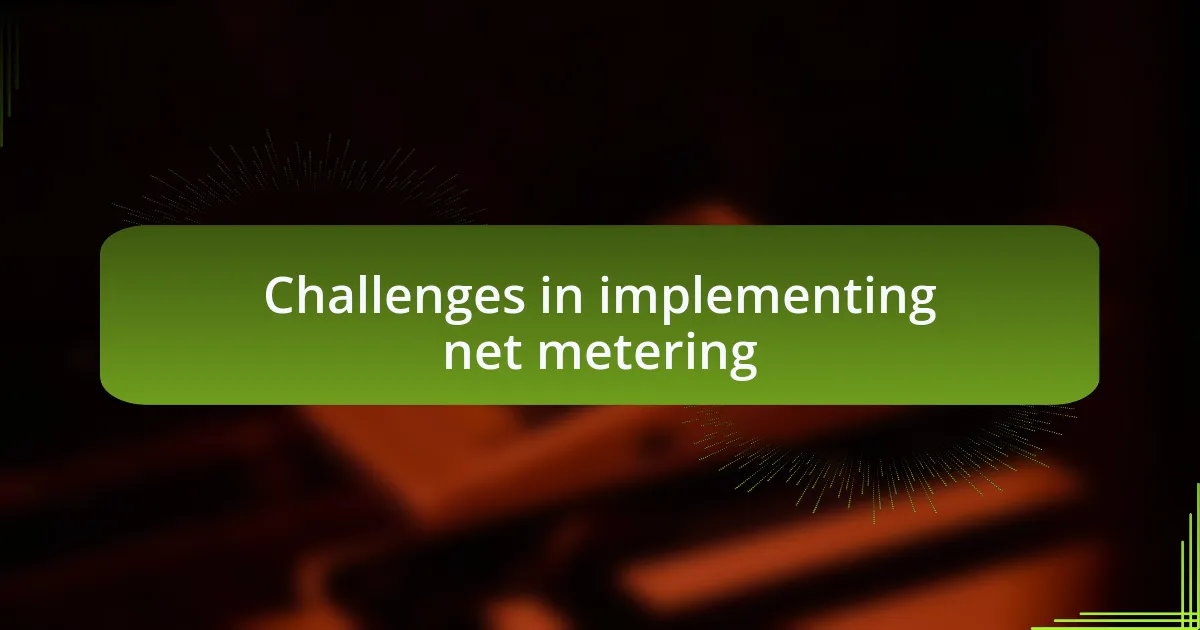Key takeaways:
- Net metering allows individuals to generate electricity, particularly using solar panels, and sell surplus energy back to the grid for credits on utility bills.
- Benefits of net metering include financial savings, energy independence, and reduced community carbon footprints.
- Challenges in implementing net metering involve regulatory hurdles, outdated infrastructure, and energy providers’ concerns about revenue loss.
- Net metering has the potential to foster community sustainability and encourage a shift in how society views energy consumption.

Understanding net metering concepts
Net metering is a fascinating concept that allows individuals to generate their own electricity, often using solar panels, and sell any excess back to the grid. I remember the first time I saw homes with solar installations; it felt like witnessing a small revolution in energy. It made me wonder: how empowering it must be to not just consume energy but actually be a producer of it.
The way net metering works is quite straightforward yet powerful. Essentially, when you generate more electricity than you use, the surplus is sent back to the grid, and you receive credits on your utility bill. This whole idea of turning your energy meter backwards just blew my mind! It really puts into perspective how energy consumption can be a two-way street.
What struck me about net metering is its potential for community impact. Imagine neighborhoods banding together, where every solar panel on a rooftop contributes to a collective reduction in carbon footprints. It raises an interesting question: could net metering be the catalyst for a more sustainable future, not just on an individual level but for entire communities? Seeing that potential motivates me to explore how technology can foster better energy practices.

How net metering works
When solar panels or other renewable energy systems produce electricity, net metering begins to shine. I remember standing in my friend’s backyard, watching their solar inverter spin in real-time, converting sunlight into usable energy. It was fascinating to see it generate more electricity than they actually needed, creating that exciting moment when they realized they could earn credits instead of just paying bills.
As the surplus energy travels back to the grid, you might wonder what happens next. Utility companies track this exchange and apply the credits to your account, effectively reducing future bills. I’ve often marveled at how this unique setup gives homeowners power in a new way, transforming them from mere consumers to active participants in the energy market.
The mechanics might seem simple, but consider this: what does it mean for households, local economies, and the environment? Each kilowatt exported not only bolsters your wallet but also supports the growth of renewable energy sources in the community. It made me reflect on my own energy habits and how such a system could reshape our relationship with electricity—less as a commodity and more as a shared resource.

Benefits of net metering systems
One of the standout benefits of net metering systems is the financial relief they can provide. I remember hearing my neighbor rave about his monthly electricity bills dropping significantly after installing solar panels. The ability to offset costs by generating their own energy really excited him, and that enthusiasm was contagious. Who wouldn’t want to see savings stack up while contributing to a cleaner environment?
Additionally, net metering fosters energy independence. I often think back to a week-long power outage in my area; it was a hassle for most, but my friend with solar panels had enough credits to power his home without any anxiety. This experience opened my eyes to how becoming self-sufficient in energy production not only feels empowering but also lessens reliance on the grid, especially during unpredictable times.
Lastly, there’s an unmistakable community benefit to consider. When I learned that more residents embracing solar translates to a reduced carbon footprint for our whole neighborhood, it gave me a warm sense of belonging. Isn’t it inspiring to know that by working together in this way, we can collectively contribute to a more sustainable future? This interconnectedness truly adds depth to the individual benefits of net metering systems, engaging us all in the mission of environmental stewardship.

Challenges in implementing net metering
Implementing net metering comes with several challenges that can’t be overlooked. For instance, I personally encountered resistance when a friend attempted to install a net metering system in her home. Local regulations can be confusing and inconsistent, and she often felt overwhelmed trying to navigate the bureaucratic maze of permits and approvals. How many people feel discouraged before even starting simply because of the red tape involved?
Another significant hurdle is the technical infrastructure required to support net metering. While visiting a community solar project, I noticed that many of the older homes struggled with outdated electrical systems that couldn’t handle the dual direction of power flow. This made me realize that a lack of investment in infrastructure can hinder progress dramatically. Isn’t it frustrating when potential innovation is stalled by something so easily fixable?
Lastly, the financial aspects pose a delicate balance. When discussing net metering with a local energy provider, I learned that they often worry about lost revenue from customers producing their own energy. This concern can lead to pushback on net metering policies, leaving potential users in a bind. Have you ever wondered how we can equitably address these concerns while still encouraging the transition to renewable energy? It’s a tricky situation and calls for collaboration among all stakeholders involved to find common ground.